The name of Ruby on Rails has gained legendary status in the tech world. While some may argue it’s becoming unpopular, others go as far as to declare it dead.
Indeed, the emergence of new frameworks has influenced web development, reducing Ruby on Rails usage. However, at Rubyroid Labs, we consider rumors of Ruby on Rails’ irrelevance to be no more than fairy tales.
This post reaffirms the excellence of Ruby on Rails for web development, supported by hard facts and our research. You’ll gain insights into why Ruby on Rails is the ideal choice for your project.
As one of the top-ranking Ruby on Rails development companies, according to Clutch.com, Rubyroid Labs boasts over 40 five-star reviews and a portfolio exceeding 300 projects for startups and companies of all sizes. If you have an idea for a web app, drop us a note. We’ll be happy to discuss your project’s specifics at your convenience.
Contents:
- Why should you use Ruby on Rails?
- What is Ruby on Rails used for?
- What is unique about Ruby on Rails?
- Does Ruby on Rails have a future?
- Why is Ruby great for startups?
- Conclusion
Why Should You Use Ruby on Rails?
Let’s be honest: when it comes to project development, the process of choosing a technology is quite painful. The variety of frameworks is large, and it’s hard to choose the best one according to business needs.
Ruby on Rails is an old and dear friend in the world of web development, offering stable and robust solutions that effectively meet two vital requirements – quality and development speed.
Here are the key reasons why Ruby on Rails should be a top consideration for your web development projects:
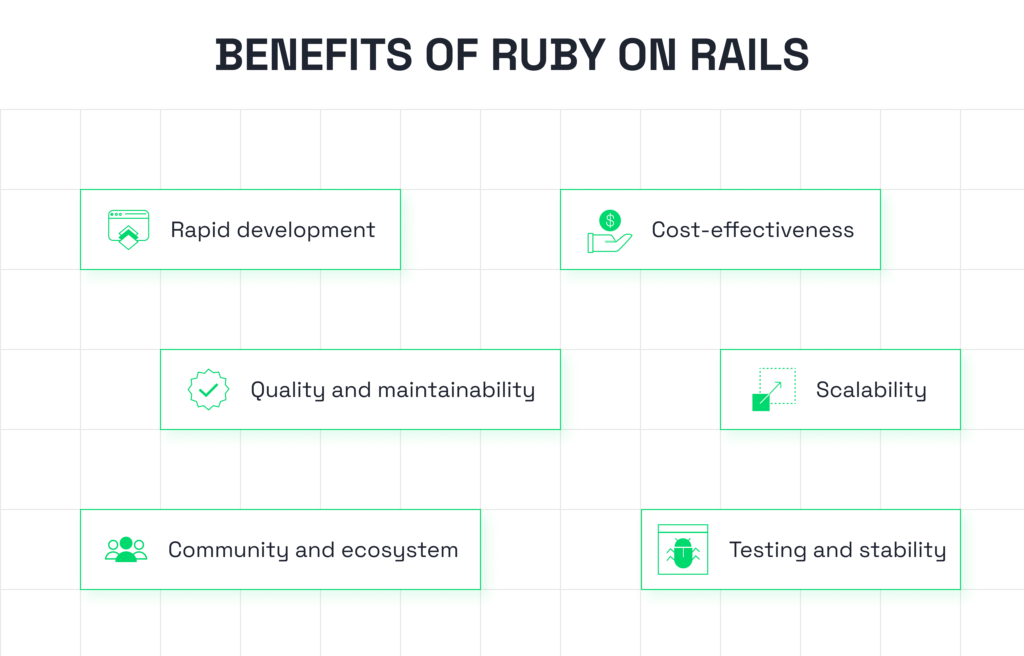
- Rapid Development
Rails facilitates accelerated web app development. This speed allows companies to launch products and features promptly to meet market demands and business goals. Its efficiency in development is a major asset for fast-paced industries.
- Cost-Effectiveness
Being open-source and free to use, Rails offers significant financial advantages. It eliminates the need for costly licensing fees, making it an economical choice for businesses looking to optimize their budget without sacrificing quality.
- Scalability
Rails is designed to manage increasing traffic and data loads. Its scalability ensures that as a business grows, its web applications can adapt and perform reliably under heightened demand without a decline in performance.
- Quality and Maintainability
Ruby’s focus on clean, readable, and maintainable code is highly beneficial, especially in dynamic environments where quick adaptation is key. Developers appreciate the language for its simplicity, enabling easy modifications and updates that allow startups to quickly pivot or evolve in response to market shifts.
- Community and Ecosystem
The Rails community is welcoming and mature, providing extensive resources like tutorials, forums, and documentation. This supportive ecosystem, enriched with numerous tools and gems, facilitates the seamless integration of diverse functionalities, enhancing efficiency and innovation.
- Testing and Stability
Ruby on Rails prioritizes automated testing, which reduces the likelihood of bugs and software issues. This emphasis on stability is crucial for startups and businesses that require reliable applications to build and maintain user trust, a fundamental aspect of growth and success.

What is Ruby on Rails Used for?
Rails is designed to simplify the process of developing web applications, meaning that a dev writes less while accomplishing tasks compared to other languages and frameworks.
RoR covers all industries and is used for the development of various web applications and mobile app backends. Considering our portfolio of over 300 projects, we’ve highlighted below the types of projects built with RoR.
MVP
Rails is ideal for minimum viable product (MVP) development. Thanks to its modular architecture, an MVP of any project can be delivered much faster, which is crucial for testing a business concept with a minimal feature set.
Example: It took us only two months to build an MVP for a car loan system.
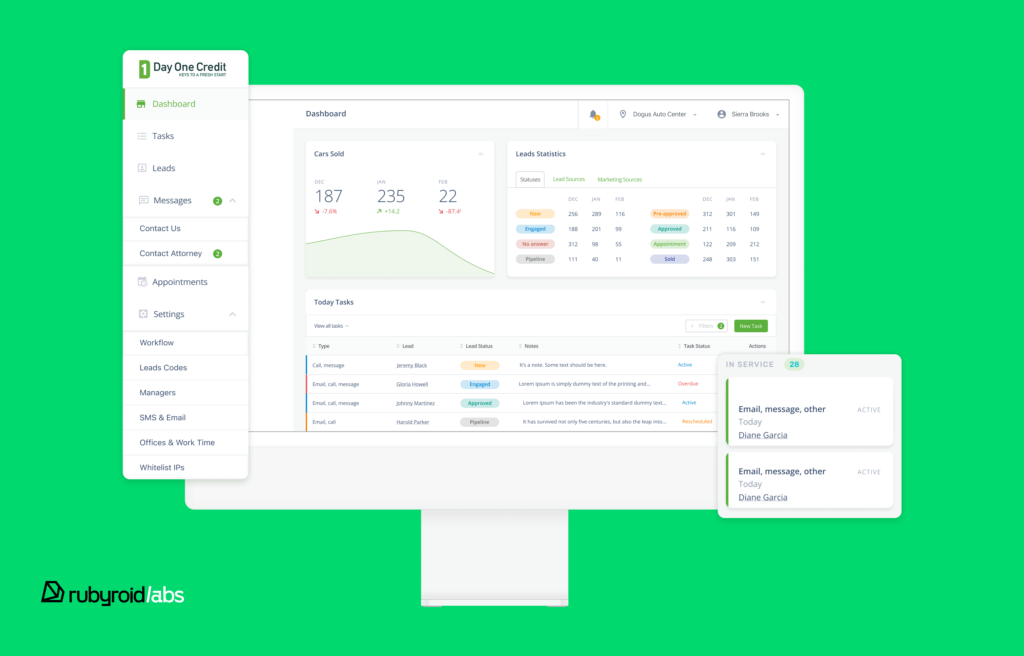
Another distinct Rails feature is that you can easily change or add other features to the app without rebuilding the whole codebase.
Mobile Backend Development
Being actually a web framework, Rails is successfully used for writing mobile app backends. It can easily manage database operations, provide authentication, and deliver APIs for mobile apps to use. RoR’s rapidity and simplicity are highly advantageous in the mobile-focused environment, where fast delivery times are critical.
Example: With the help of Ruby, we developed a car wash and valeting mobile app for Volvo.
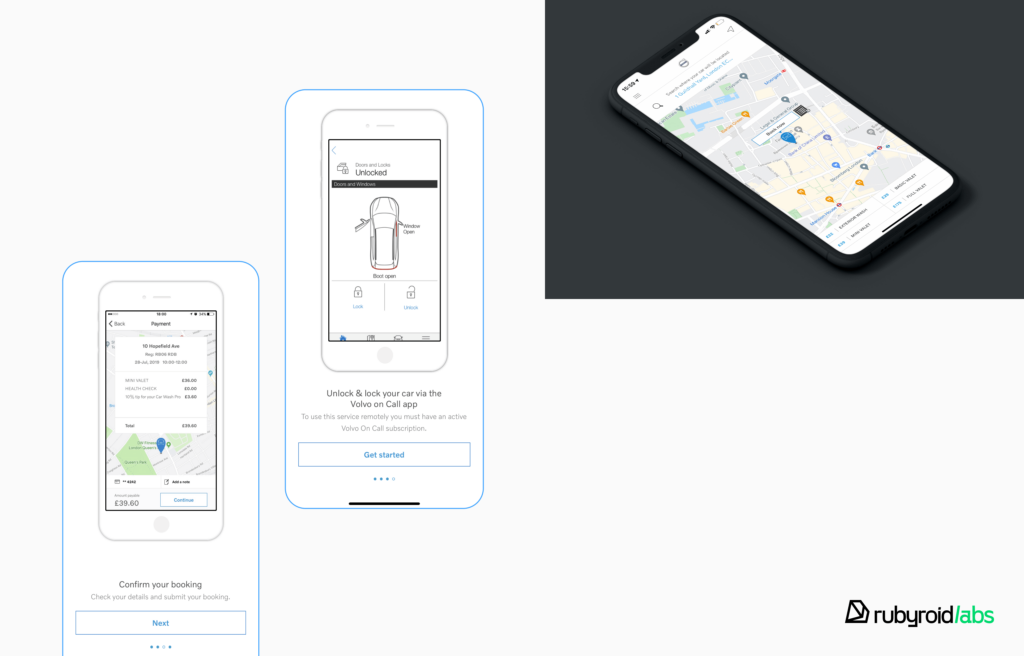
Marketplaces
Online marketplaces, where various buyers and sellers trade, require robust, scalable, and secure systems. Rails is a fantastic choice here because it has instruments and gems that are designed specifically for managing user interactions, payments, and complicated database relationships. Its RESTful architecture ensures that the system can efficiently manage a variety of resources, which is essential for any marketplace application.
Example: a marketplace built by Rubyroid Labs’ RoR team.

CRM / ERP systems
Customer Relationship Management (CRM) and Enterprise Resource Planning (ERP) systems help companies manage customer data and internal workflows. Rails is appropriate for these systems because it places a heavy focus on database administration and data processing. It also enables the simple integration of third-party apps and services, which is frequently required for CRM and ERP systems to work properly.
Example: A CRM system built by our RoR team for one of travel operators, Sail Croatia.
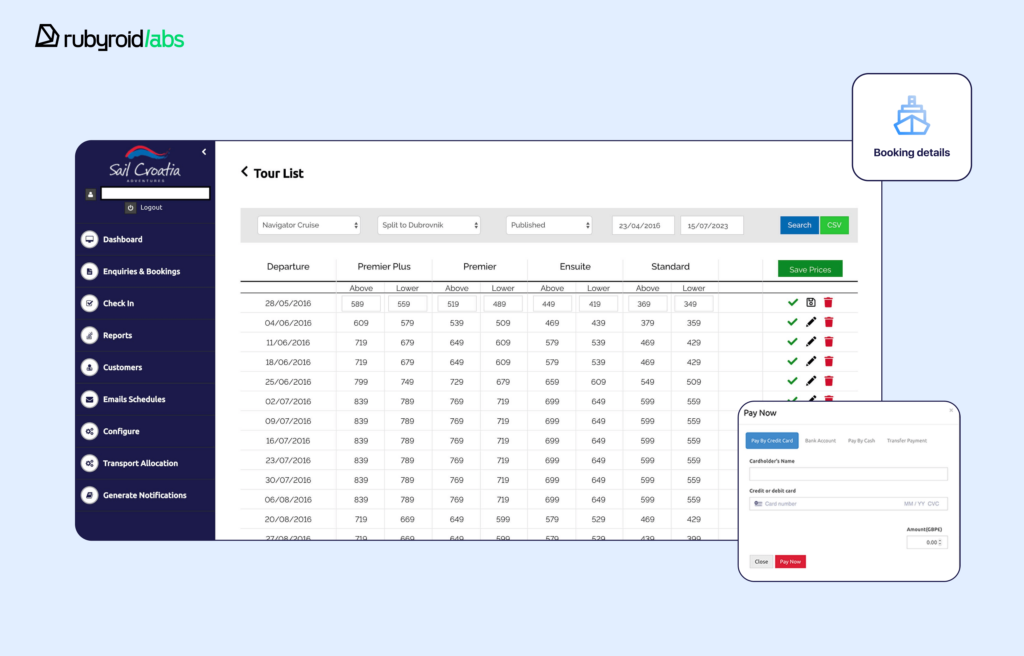
Software as a Service (SaaS) platforms
Rails is popular for developing SaaS apps because of its ease of integration with third-party services and effective database management. The framework’s support for a service-oriented architecture (SOA) makes it easier to create scalable SaaS applications that can evolve according to changing business demands.
Example: See how we helped a SaaS company integrate services.
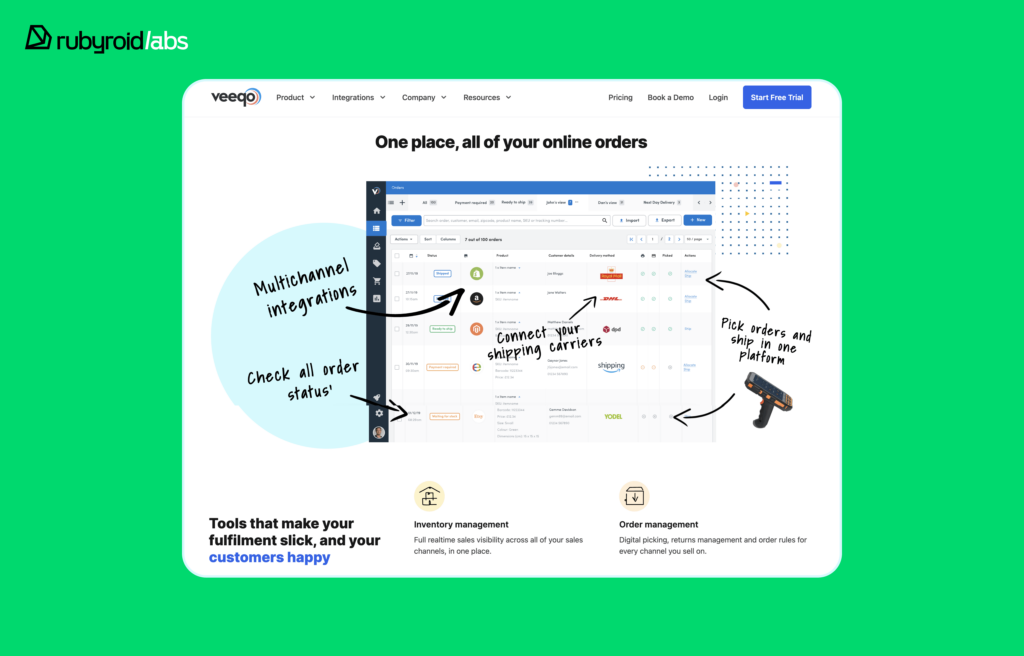
Ruby on Rails supports the development of a wide range of applications of any complexity. Developers choose it for its user-friendly nature and powerful features that enable building efficient and maintainable web apps, including:
- educational platforms;
- social networks;
- sharing apps;
- dating apps;
- booking apps;
- information platforms, and more.
Since 2013, Ruby on Rails has been our core technology for creating optimal solutions for businesses of all sizes. At Rubyroid Labs, our middle-level and senior rails developers have achieved cost savings of over 30–60% for enterprises using RoR.
If you are looking to entrust your idea to an experienced Ruby on Rails company, drop us a line. You’ll get a professional view based on eleven years of expertise and receive a free quote.
What is Unique About Ruby on Rails?
Ruby on Rails has been a serious player in the web development world since its introduction in 2004. It revolutionized project development with its unusual features, which have weight even today, making it the best choice.
Let’s see what superpower Ruby on Rails has that sets it apart from other web development frameworks.
Convention over Configuration
Rails emphasizes simplicity and productivity, following the principle of “Convention over Configuration”. It means that the framework assumes reasonable defaults for many aspects of a web application, and a developer doesn’t need to specify every detail manually and spends less time on coding.
Don’t Repeat Yourself (DRY)
This idea is the foundation of RoR. It eliminates duplication in code, which not only makes it more comprehensible but also less likely to face problems and simpler to maintain.
Integrated Testing Framework
RoR is built into the framework, encouraging test-driven development (TDD). As a result, applications become less fragile and reliable, and the development process runs without a hitch.
Ruby Language
Ruby on Rails is based on the Ruby language, which is known for its elegance and readability. Ruby’s syntax is user-friendly and often regarded as being similar to spoken English, making the code easier to learn and maintain.
Rich Libraries (Gems)
RubyGems, Ruby’s package manager, gives access to a wide library of “gems” (pre-packaged libraries or utilities) that may be readily implemented in Rails applications. This enormous ecosystem of reusable components significantly accelerates the development process.
Active Record
This is RoR’s Object-Relational Mapping (ORM) layer, which simplifies data management in apps. Active Record automatically translates tables to classes and records to objects, making database interaction much simpler.
Fast Development
The integration of all Rails functionalities greatly speeds up project development. This makes the framework an excellent choice for startups and businesses seeking to quickly create and deploy web apps.
In summary, Ruby on Rails stands out due to its unique philosophy and the comprehensive range of features it offers, making web development more efficient, organized, and accessible.
Does Ruby on Rails have a future?
The appearance of new frameworks has expanded more possibilities for web project development, which is beneficial for the tech market as it gradually phases out outdated tools.
Against this backdrop, Ruby on Rails may seem to be used less frequently, prompting discussions about its future.
Let’s speak facts and draw conclusions about Rails’ future based on the following statistics:
- Ruby on Rails ranks among the top 20 popular programming languages in 2023.
- At its current version, 3.3.0, RoR receives over 10 updates annually, which means that the language is alive, secure and regularly upgraded.
- Companies across various industries, including Airbnb, Netflix, Fiverr, Ask.fm, and Volvo, have either fully or partially developed their digital products using Ruby on Rails.
These facts suggest a promising outlook for the Ruby framework.
Further, let’s delve into the strengths and weaknesses of Ruby on Rails in comparison to its key competitors, Django (Python) and Express (Node.js).
At Rubyroid Labs, we have conducted research focusing on several critical aspects of these three technologies:
– Ease of use
– Performance
– Community support
– Real-time applications
– Development speed
This comparison aims to provide a more detailed perspective on where Ruby on Rails stands in the current web development landscape.
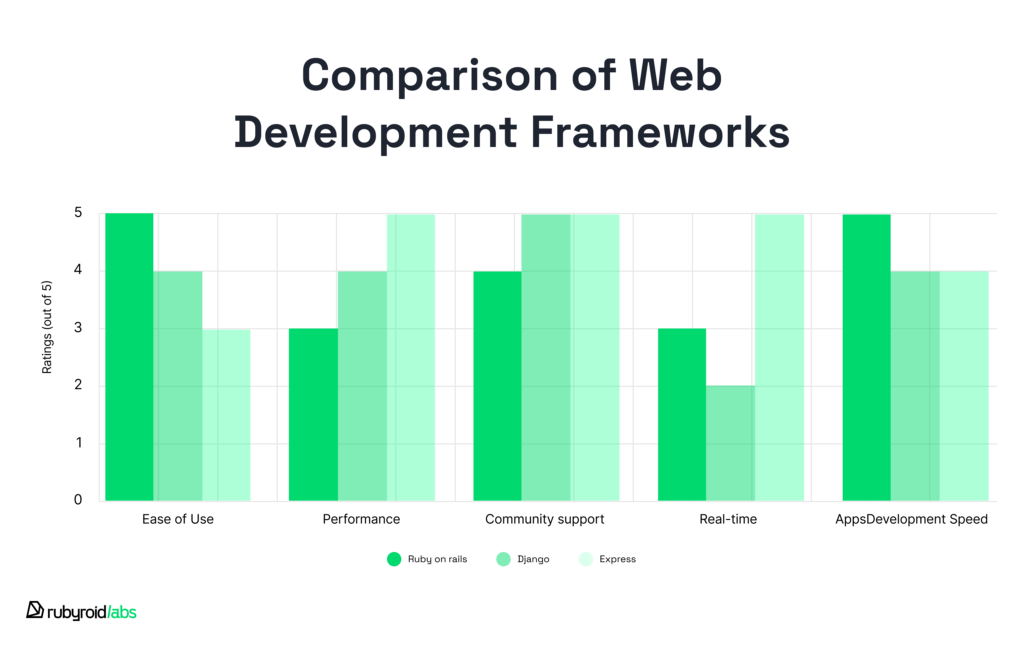
The result of the analysis indicates that Ruby on Rails has been somewhat underrated, overcoming its competitors in at least two categories.
Let’s see in detail the characteristics of each parameter among the frameworks.
Ruby on Rails (RoR) – Ruby
Ease of Use: RoR is highly appreciated for its ‘Convention over Configuration’ approach, which simplifies the development process and lets Ruby on Rails developers concentrate on writing code instead of spending time on extensive configurations.
Performance: While Rails offers adequate performance for most web applications, it may lag behind in high-performance scenarios compared to Node.js.
Community Support: Rails has a strong and dedicated community, with a wealth of resources, libraries (gems), and active forums.
Real-time Applications: Ruby on Rails provides support for real-time features with ActionCable, but it’s less efficient at handling real-time applications than Node.js.
Development Speed: RoR is the best in this category. Its opinionated nature and extensive libraries contribute to fast development cycles, allowing developers to deliver products much faster compared to using the Express and Django frameworks.
Django – Python
Ease of Use: Django offers great clarity and control and is known for its explicit nature. However, it is less streamlined than RoR when it comes to quick development.
Performance: Python generally has better performance than Ruby, making Django a slightly more performant framework than RoR.
Community Support: Django has one of the strongest global communities, known for its support in web engineering and other areas like data science.
Real-time Applications: Django isn’t traditionally optimized for real-time applications, similar to Rails, although there are ways to achieve this.
Development Speed: Although Django provides rapid development, it still isn’t as quick as Rails due to its emphasis on explicit configuration.
Express – Node.js
Ease of Use: Express offers flexibility but may require more configuration compared to Ruby on Rails, which can be less straightforward and provides a more structured development experience.
Performance: Node.js is valued for its high performance, especially in handling asynchronous tasks and real-time applications, leaving behind Rails and Python.
Community Support: The Node.js community is also extensive and offers a vast number of available packages, providing developers with comprehensive support and resources.
Real-time Applications: This is where Node.js shines because of its excellent capabilities for building efficient real-time applications.
Development Speed: The lack of conventions sometimes slows down the product development of the Express framework, which makes it less suitable for startups and projects that are short on time.
After this brief research, there are no doubts about the future of Ruby on Rails. The framework is easy to use, agile, and facilitates rapid development—qualities that are crucial for projects and that will keep this programming language in demand for years to come.
Seeking a company to develop an MVP or a complete project? Get in touch with us for a free quote and to gain an experienced perspective on your idea.
Why Is Ruby Great for Startups?
Ruby on Rails is popular among startups, as it champions fast and efficient web application development. Designed with rapidity and flexibility in mind, it enables businesses to quickly introduce their products to the market and easily scale as their user base grows.
This adaptability is crucial for startups that need to evolve swiftly, show the stakeholders the potential of the project, and change in response to growing business demands.
Here are the top reasons to choose RoR for startup development:
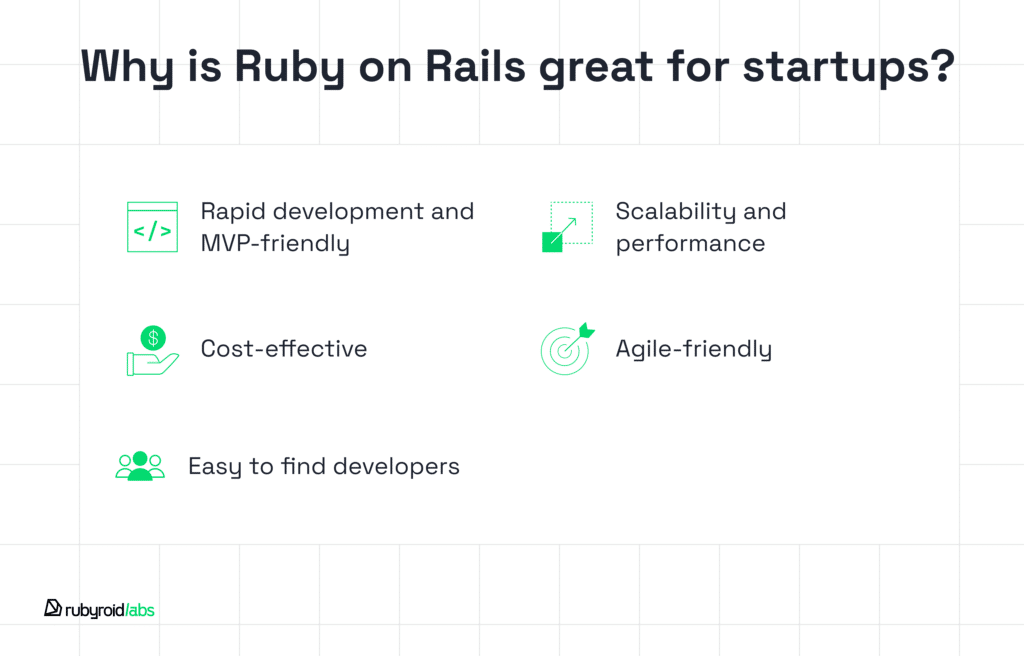
1. Rapid Development and MVP-friendly
The startups receive their minimum viable products (MVPs) in a shorter timeframe and can get feedback more quickly from the target audience and the market. This rapid result is critical for the project’s future.
2. Cost-Effective
Ruby is an open-source language that is free to use. It has a large Gems library providing ready-made solutions to common problems, which allows it to add powerful features without the need for costly custom development.
3. Scalability and Performance
The effectiveness of Ruby on Rails is proven by companies-giants that grew up from MVPs built with RoR. They are: Shopify, Uber, Dropbox, Hubspot, Twitter (X), GitHub and other projects that keep on using Ruby on Rails to build complicated, high-traffic online apps.
4. Easy to find developers
Ruby on Rails boasts a widespread community, ensuring a vast pool of talent that is familiar with the framework. This means startups can conveniently recruit developers who are proficient in Ruby on Rails, significantly reducing the time and costs involved in training and integrating new team members.
5. Agile-Friendly
Ruby on Rails works wonderfully with Agile development methodologies. Its flexibility allows for iterative development, continuous integration, and regular updates – all hallmarks of Agile practices. This alignment with Agile methodologies means startups can be more responsive to user feedback and market trends.
Rails combines speed, efficiency, cost-effectiveness, and quality, making it a top choice for startups. Its ability to handle rapid development cycles, along with the support of a robust community, ensures that startups can not only launch their products swiftly but also maintain and scale them as they grow.
Conclusion
Reflecting on our eleven-year experience and the successful launch of over 300 projects, we see that Ruby on Rails is chosen for its unique and enduring benefits. They include a team of dedicated professionals, smooth development, and high-quality code.
If you are in search of a Ruby on Rails company with highly skilled developers who provide a full development cycle, share your idea with us, and we’ll transform it into an exceptional product.
The myths of Ruby on Rails waning popularity have no substantial evidence. It is expected to maintain its position in the global top 20 list of programming languages. According to Google Trends, it is still a popular backend framework with persistent popularity.
- Startups opt for Ruby on Rails for its ability to rapidly and cost-effectively develop powerful web applications. This capability enables them to expand their business and excel in their core competencies.
- All-size companies choose RoR to build scalable projects that grow alongside their business and adapt to the changing needs of their target audience.
Despite the emergence of new programming languages and their influence on web development, the RoR framework will continue to be highly regarded in the tech world.




